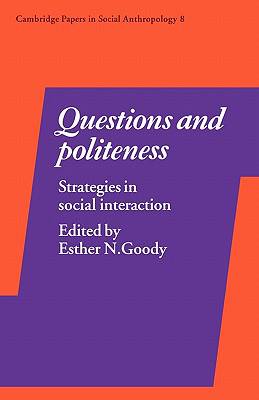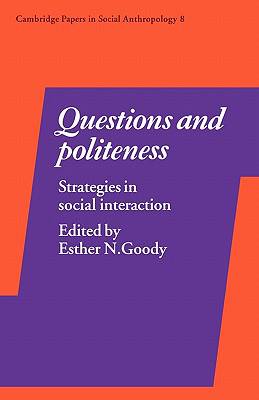
Bedankt voor het vertrouwen het afgelopen jaar! Om jou te bedanken bieden we GRATIS verzending (in België) aan op alles gedurende de hele maand januari.
- Afhalen na 1 uur in een winkel met voorraad
- In januari gratis thuislevering in België
- Ruim aanbod met 7 miljoen producten
Bedankt voor het vertrouwen het afgelopen jaar! Om jou te bedanken bieden we GRATIS verzending (in België) aan op alles gedurende de hele maand januari.
- Afhalen na 1 uur in een winkel met voorraad
- In januari gratis thuislevering in België
- Ruim aanbod met 7 miljoen producten
Zoeken
€ 64,95
+ 129 punten
Omschrijving
These essays, by anthropologists and anthropological linguists, draw on material from speech communities in three continents to raise fundamental questions about the ways in which interrogative and politeness forms are used in day-to-day social interaction. The authors suggest that interrogative and politeness forms have universal features which make them efficient for certain strategies of interaction. Why should these strategies constantly recur? Here the focus shifts to the consideration of status and power, social roles and social distance. Esther Goody looks at the way in whichy the institutionalization of questioning allows only for speech acts consistent with status differences. Brown and Levinson claim that speech acts are potentially threatening to those being addressed, and that politeness forms have evolved as a mechanism for reducing such threats. They analyse the conditions under which politeness forms will be used and show that their findings are consistent with data drawn from India, Mexico and the US.
Specificaties
Betrokkenen
- Auteur(s):
- Uitgeverij:
Inhoud
- Aantal bladzijden:
- 334
- Taal:
- Engels
- Reeks:
- Reeksnummer:
- nr. 8
Eigenschappen
- Productcode (EAN):
- 9780521292504
- Verschijningsdatum:
- 23/03/1978
- Uitvoering:
- Paperback
- Formaat:
- Trade paperback (VS)
- Afmetingen:
- 140 mm x 216 mm
- Gewicht:
- 426 g

Alleen bij Standaard Boekhandel
+ 129 punten op je klantenkaart van Standaard Boekhandel
Beoordelingen
We publiceren alleen reviews die voldoen aan de voorwaarden voor reviews. Bekijk onze voorwaarden voor reviews.









